Chris Jones's Blog, page 20
July 28, 2016
Top tips for directing when you’re the only beginner on set by Kat Wood
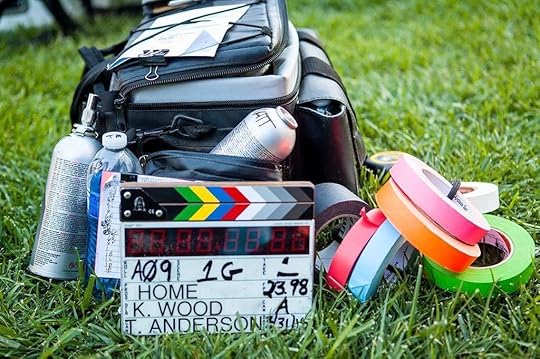
 Earlier this year I directed my first short film. I had always thought that making my first film would be similar to most other people’s first short film experience – it’d be small scale, probably filmed in or around my own house with just a few people to help out. More like a ‘practice and learn’ exercise than anything else.
Earlier this year I directed my first short film. I had always thought that making my first film would be similar to most other people’s first short film experience – it’d be small scale, probably filmed in or around my own house with just a few people to help out. More like a ‘practice and learn’ exercise than anything else.
But then I won the Jameson First Shot Competition, and flew to LA to direct my very first short film starring Academy Award nominee Maggie Gyllenhaal and produced by Kevin Spacey. Every person involved with the film was a professional with way more experience than me. Faced with this learning curve, here are a few tips from my experience.
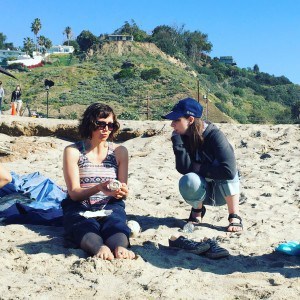 Be prepared
Be prepared
I’d been planning to direct for a little while already, so had read a lot of books, watched director’s DVD commentaries, learnt all I could about directing from the internet and asked questions of director friends. This background preparation was invaluable.
Spend time with your actors
You might’ve written the script but they’re the ones who have to bring it to life and make it real. Listen to their ideas and collaborate ahead of the shoot, and make sure you’ve prepared well enough with your DoP so that you can spend lots of time with your actors on set too.
Ask questions
Even if you think it’s a stupid question, ask it. As a complete beginner, it’s also worthwhile throwing in a ‘is there anything else we should’ve covered that we haven’t talked about yet’, with your HoDs.
Be collaborative
The people working with you on your film are all trying to make it better. Get their input and get a better film.
Know your story
As a working screenwriter, my approach is that every directing decision I make should be informed by and in service to the story. If you know your story, then there shouldn’t be many questions that you struggle to answer ahead of the shoot or on set.
Communicate
Make sure that you communicate what you are looking for very clearly, and if you change your mind that’s ok, just say so and be clear about it.
Lead
Even if you have no experience directing like I did, everyone is expecting you to lead. Show confidence even if you don’t feel it, believe in yourself that you can do it and trust your instincts. After all, you can only make the film once!
Kat’s Jameson First Shot film HOME premiered at Paramount in LA on July 30th, and is available to watch on you tube, vimeo and at www.jamesonfirstshot.com.
You can also follow Kat on twitter: @katruthwood
 Kat has a background in broadcast journalism, and works as a professional screenwriter. In 2014 she was voted on to The Tracking Board’s ‘young and hungry’ list, which lists the top 100 emerging writers in Hollywood and is voted for by industry professionals. She currently has three feature scripts under option and her first produced feature, ARTHUR & MERLIN, was released in the UK and US on DVD/VOD at the end of last year. Kat is a John Brabourne Awardee 2016 and is represented by Zero Gravity Management.
Kat has a background in broadcast journalism, and works as a professional screenwriter. In 2014 she was voted on to The Tracking Board’s ‘young and hungry’ list, which lists the top 100 emerging writers in Hollywood and is voted for by industry professionals. She currently has three feature scripts under option and her first produced feature, ARTHUR & MERLIN, was released in the UK and US on DVD/VOD at the end of last year. Kat is a John Brabourne Awardee 2016 and is represented by Zero Gravity Management.
May 23, 2016
How to win the Sci-Fi London 48 Hour Challenge
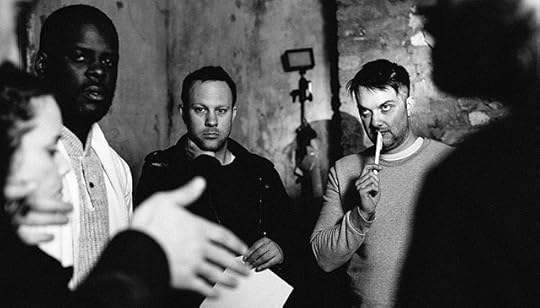
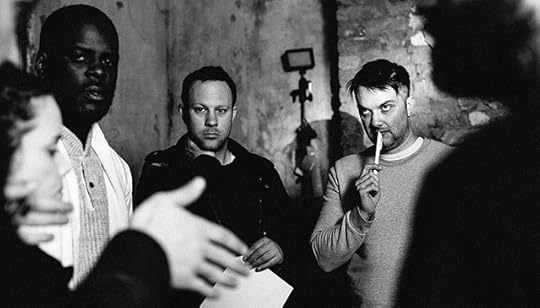
Writer-director Stuart Black spills the secrets
May 4th is said to be a lucky day for Star Wars fans, but for me and my team it was a day for gnawing fingernails right down to the knuckles. Having got into the top ten of the Sci-Fi London 48 Hour Film Challenge, we were impatiently waiting to see whether we’d managed to get a podium place for No Guarantee, the short film we’d made over the course of a weekend back at the beginning of April:
May 4th is said to be a lucky day for Star Wars fans, but for me and my team it was a day for gnawing fingernails right down to the knuckles. Having got into the top ten of the Sci-Fi London 48 Hour Film Challenge, we were impatiently waiting to see whether we’d managed to get a podium place for No Guarantee, the short film we’d made over the course of a weekend back at the beginning of April:
At around 9:30pm, having watched all the best entries at Stratford Picturehouse, we finally found out we’d won and ran down to shake our chewed-up hands with the head of the judging panel Frank Spotnitz (producer of The X-Files and The Man In The High Castle).
It’s taken a few days to recover from the shellshock of winning (and the hangover caused by the party that followed). But now that I can type properly again, it’s as good a time as any to try and figure out where it all went right. So here are seven things I believe helped us get our mitts on the trophy.
Experience: This was our second run at the competition, the team having come together last year to make a film about racists taking over London called Matter Of Fact https://vimeo.com/124813790 That one made the shortlist but missed out on a top three place – which was disappointing at the time, but really it was that experience that proved to be our most valuable asset this time round. It meant we knew full well how little sleep we’d get and what mistakes were likely to might set us back. That said, we still made a whole bunch of different mistakes – but they were less obvious in comparison.
Gareth Edwards: We found that continually invoking this director’s name, since he won the competition in 2008, was a good way to gee up the team: “Guys, if we win this we will be making the next Star Wars movie, okay?” We are now waiting for JJ to call – we have a pretty cool idea for Rogue Two.
Not Cheating: Of course everyone goes into the competition with ideas swirling around in their heads (you’d be braindead not to), but since you get given a title, props and dialogue as part of the contest, it does pay to be able to respond to these. On a side note, this year was hit by a bizarre cheating scandal when one team, whose script was written by a computer, was disqualified from the audience prize after programming the machine to be able to vote for itself, which it did 10,000 times. O-kay. This led to the unfortunate scrapping of the audience vote.
Location: We’d learned from watching previous year’s winners that securing a cinematic space to film in gave you a legitimate head-start. So we decided to put what little cash we had into renting a tumbledown old house near Peckham’s Bussey Building. And voila: instant production values.
Feeling the pain: We absolutely love our brilliant and dedicated actors, but since the story we came up with called for them to be caught in a doomed romance, we needed to see real suffering. Luckily, Justin Marosa was allergic to the dust in the house while Alice Henley was allergic to her costume (we made her a corset out of fibre glass tape – oops).
Coffee: The post-production process was supposed to be wrapped up by midnight on Sunday, but perhaps inevitably it turned into a desperate all-nighter. This meant me and my co-writer/director Nick Mather were basically on espresso duty way into the smallest hours as we tried to keep the team from collapsing at their keyboards. It has to be said, this was the hardest part of the weekend to get through. As someone wise probably once said: Tiredness leads to sensitivity. Sensitivity leads to temper tantrums. Temper tantrums lead to the dark side.
Guerilla-ism: Finally, we have to give serious props to Chris Jones since the core of our team first met at his Guerilla Filmmaking course a few years ago. In all honesty, it was the fact that Chris hypnotised us into thinking we could make a film that kick-started our first attempt. That said, he’s not getting us to walk over red hot coals – ever.
Stuart Black// Fillmmaker
May 18, 2016
Top Ten Tips for Crowdfunding Your Feature Film by Stephen Follows

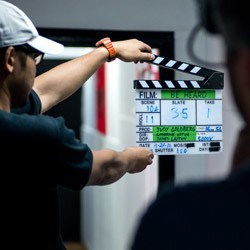 We filmed this short video with Stephen Follows last week to offer a glimpse into what you can expect at his two day masterclass next month (www.SuccessfulCrowdfunding.co.uk)
We filmed this short video with Stephen Follows last week to offer a glimpse into what you can expect at his two day masterclass next month (www.SuccessfulCrowdfunding.co.uk)
It’s amazing when you consider that Kickstarter has now raised over $1bn for indie filmmakers. Let that number settle for a moment. Then ask ‘why don’t I have a piece of that pie?’
In the video Stephen offers tips on…
Ask for what you NEED and you are likely to succeed
How long should your campaign be? The proven sweet spot
Why the day you end your campaign is SO important
It’s not how much you need, it’s how many backers will make it happen?
The single biggest factor in Crowdfunding success
Why you MUST be in your own campaign video
Why being funny in your campaign will reap rewards
Is your video the optimum length? What is the sweet spot?
What is the correlation between number of awards and campaign success?
Why you MUST back other people’s campaigns for your own success
And finally, as a bonus, a top secret way to save 10% on your crowdfunding fees
The bottom line is Crowdfunding is the best way for 90% of filmmakers to get finnanced. See you on the course. www.SuccessfulCrowdfunding.co.uk
Onwards and upwards!
Chris Jones
My movies www.LivingSpiritGroup.com
My Facebook www.Facebook.com/ChrisJonesFilmmaker
My Twitter @LivingSpiritPix
Sign up to my mailing list for updates on
events, books and free film making tools
April 16, 2016
What are you doing this weekend? Want to watch a stunning cold war drama and true Brit indie film?
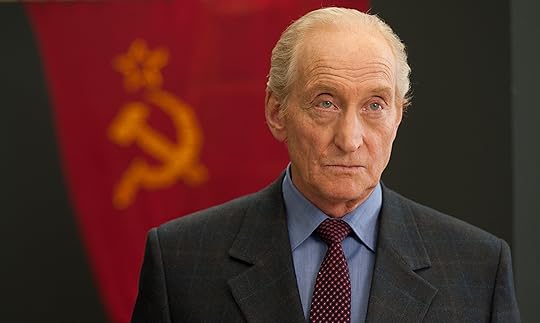

My good friends Shamim Sharif and Hanan Kattan have their third feature released in cinemas this weekend. It’s called ‘Despite the Falling Snow’ and stars Charles Dance and MI:5 actress Rebecca Ferguson. It’s a beautiful film and 100% indie too. Both have committed to sharing with us their insight and journey so we can learn how they have managed to successfully make three stand out movies.
But right now, all of us can make a MASSIVE difference to their film. If you want to do something extraordinary this weekend, go see the film and take a friend or six!
 For Shamim and Hanan the next 24 hours will define the success of their film. They have a goal is to hit the cinema ‘house nut’ so their film is held over for a second week. This will have a knock on effect with international sales and UK broadcasters who are then more likely to buy the film.
For Shamim and Hanan the next 24 hours will define the success of their film. They have a goal is to hit the cinema ‘house nut’ so their film is held over for a second week. This will have a knock on effect with international sales and UK broadcasters who are then more likely to buy the film.
So this is your chance to pay it forward and help platform UK filmmakers, UK film and in due course, I will make it happen than they share their extraordinary journey with us all in a very tangible way.
It’s playing in 60 cinemas and I promise it will be a great night out for you and your friends.
See you in the front row!
Chris Jones
www.ChrisJonesBlog.com
PS – If you want to know what the house nut is, and why it is important for your film release, there is an article HERE from my Movie Blueprint book.
April 11, 2016
Litopia After Dark Radio Show

 Last week I was a guest on the wonderful Litopia After Dark radio show which you can listen to below.
Last week I was a guest on the wonderful Litopia After Dark radio show which you can listen to below.
I was sharing the airwaves with authors Shamin Sarif and David Sanger and what resulted is an hour of wonderfully eclectic conversation around writing. Loosely.
http://www.radiolitopia.com/enclosures/lad/lad_265.mp3
The official site is HERE.
Onwards and upwards!
Chris Jones
My movies www.LivingSpiritGroup.com
My Facebook www.Facebook.com/ChrisJonesFilmmaker
My Twitter @LivingSpiritPix
Sign up to my mailing list for updates on
events, books and free film making tools
March 1, 2016
Filmmakers: How to sell a product AND change the world

For me this short film perfectly illustrates how traditional advertising AND powerful filmmaking can not just co-exist, but flourish. It’s an exciting trend that we are seeing over and over.
The reason why this works so well is that it offers a powerful truth AND also offers a solution. Crucially, it’s not a quick fix or even ‘buyable’ fix, but it’s one that feels right and resonates. Nor does it seek to shame anyone, make them wrong or send them on a fear / guilt trip. Instead it chooses to inspire change in behavior. That’s remarkable for advertising which would normally prey on fear.
Great stuff and let’s hope manufactures continue to see the value in great and truthful storytelling.
Onwards and upwards!
Chris Jones
My movies www.LivingSpiritGroup.com
My Facebook www.Facebook.com/ChrisJonesFilmmaker
My Twitter @LivingSpiritPix
Sign up to my mailing list for updates on
events, books and free film making tools
February 23, 2016
The Singularity 50… What do YOU think our future history looks like?

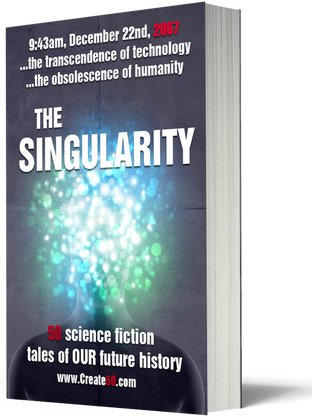 We want YOU to help write the backbone for the next Create50 book.
We want YOU to help write the backbone for the next Create50 book.The next book from Create50 is ‘The Singularity 50’. It will be SciFi stories of 2,000 words or less about the day leading up to the Singularity, and the actual day that technology looks down on humanity, evolving beyond us.
We plan to launch the initiative at the end of March but we want you to get involved in shaping it now.
Like with Impact, we are putting together a timeline for The Singularity 50, identifying some of the key events and crucial turning points leading up to the day of the Singularity, December 22nd, 2067.
We want this timeline to inspire our writers, and also to offer a consistent framework so that ALL the stories feel part of a single world and time period.
SO… We are opening things up to the floor, and asking YOU to help us build upon, and better, our proposed future history.
This is YOUR future history, as much as it is ours, and we want you to have as big a say as possible.
What you see below is our current proposed timeline. It’s NOT fixed and 100% editable. A starting point. All we know is it starts today and ends in 2067… 50 years from the publication of the book in 2016.
Take a look at it and if there’s something you think is missing, or not quite right, or could be explained better, then leave your comments ON THE BLOG HERE.
We will take the best ideas and incorporate and re-edit the Future History of The Singularity.
So to be super clear.
When we launch the story writing process in March, we want this future history to be locked so we can all nominate a time and place for our stories – we will know what has happened in the past and where we are at, and will happen in the future.
Importantly, the story you choose to tell does not need to be about any aspect of the future history, this is just a guide to ensure all our stories feel part of a whole.
And we imagine that around half of the final book will be stories in the years from today, leading to the Singularity in 2067, and the other half will take place on the day of the Singularity. (Note this is not a promise of a fifty fifty split between stories, it will all depend on the final work).
We also imagine a series of tech companies to lead the way, perhaps conglomerating. Feel free to imagine their role. We have called it GCorp for now, but feel free to invent new companies and names.
Ask questions too. A good question will throw up an enticing imagined answer from the community.
OK… So please improve, (argue to move or remove stuff), augment, add too, imagine, invent, reinvent… to this existing timeline below.
Leave your comments ON THE BLOG HERE and we will update as we go…
Countdown to the Singularity… Our future history
2017 – Self-driving cars are introduced onto the roads in the United States. Other countries the world over follow America’s lead.
2020 – Winner of the $5million A.I. X Prize is announced. The winning team created A.I. software that assisted with the logistics of humanitarian aid campaigns.
2023 – There is widespread implementation of machines used for hospital diagnostics.
2024 – Human error crashes lead to a ban on human-controlled cars in Switzerland.
2028 – Introduction of automated cargo planes.
2029 – The world economy crashes due to oil shortages caused by continued Middle East and Russian unrest.
2030 – The United States deploys Infantry supported by AI controlled automated soldiers to pacify the middle east.
2032 – The first sexbots sell in their masses.
2035 – International Technology Council is established.
2037 – Humanity steps foot on Mars, aided by AI and Quantum computers.
2039 – AI and quantum computing combine to create free clean energy, patented by Californian company GCorp. The war in the Middle East ends abruptly, though local unrest grows.
2042 – New regulation on the Use of Artificial Intelligence Technology is implemented following a tragic death.
2048 – Household robots become available for the wealthy.
2050 – Introduction of automated passenger planes.
2052 – Global pandemic of Bird Flu threatens to bring planet to knees but AI and Quantum mechanics quickly develop 100% successful vaccine that is easy to manufacture.
2056 – A.I. given Nobel Peace prize for work in the pandemic and saving lives.
2058 – Courts in Germany are handed over to A.I.
2060 – Household robots are now in the majority of homes in the West. A.I. now the primary cause of divorce due to hacked pleasure code being easily inserted in to A.I. code.
2061 – Increasing incidence of hacked A.I. units being used for crime, including murder.
2063 – Anti A.I. Abuse Law passed in the United Kingdom. Quickly adopted around the world.
2065 – A.I. and newly invented ‘infinite quantum’ computing proves / dissproves the existence of a God (which do you think and what would happen?).
2066 – The final development… The Singularity.
Right.. Over to you… Add your thoughts and remember to suggest a year…
And please share this far and wide.
Emma Heath
The Singularity Team Leader
Chris Jones
Create50
February 20, 2016
Listen to Joseph Campbell Lectures: The Power of Myth and Storytelling online and free
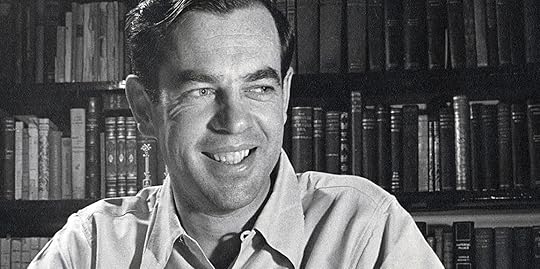
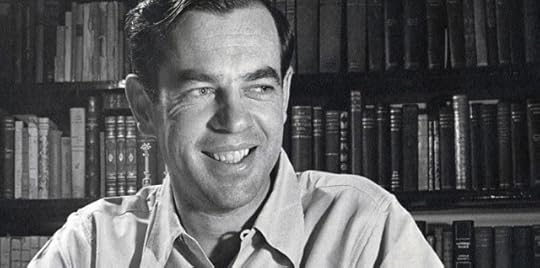
Anyone who has seen me speak at the London Screenwriters’ Festival or come to the Guerilla Filmmakers Masterclass will know that I hold in high regard the ‘heros journey’ story model.
It was first and most comprehensively written about by Joseph Campbell (and famously plundered by George Lucas with Star Wars).
Many story models are useful, but many are also very rigid and highly structured. In contrast the heros journey is flexible and fluid and for me it feels more like a set of principles and not a set of rules.
I just came across this archive of lectures from the man himself and I have begun the journey of listening to them myself. Listen to the first below via Spotify.
And listen to the entire series on Spotify HERE.
I hope you find them as insightful as I have done.
Onwards and upwards!
Chris Jones
My movies www.LivingSpiritGroup.com
My Facebook www.Facebook.com/ChrisJonesFilmmaker
My Twitter @LivingSpiritPix
Sign up to my mailing list for updates on
events, books and free film making tools



